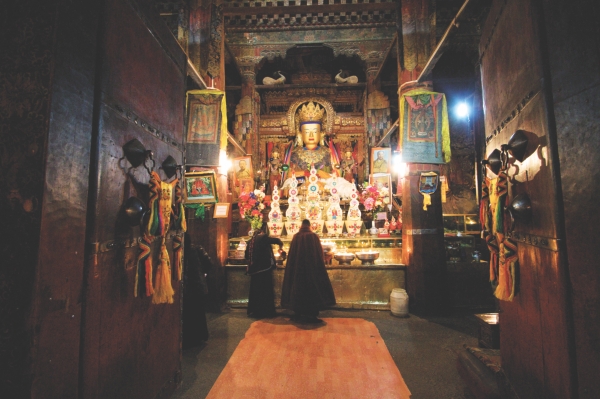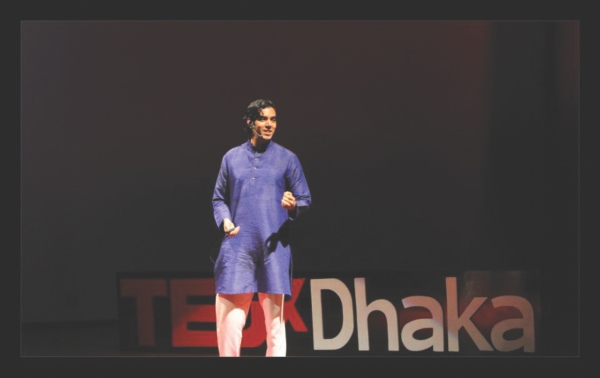| Home - Back Issues - The Team - Contact Us |
 |
| Volume 11 |Issue 39| October 05, 2012 | |
|
|
Heritage
Highlighting Bengal's Tradition of Pluralism Maya Barolo The Pluralism Project is the brainchild of Samier Mansur, who recently returned to Bangladesh from the United States in order to learn more about his Bengali heritage. The Project aims to produce a documentary film that will highlight Bengal's ancient tradition of religious and ethnic tolerance and pluralistic values, which Mansur believes are the key to achieving Bangladesh's economic stability and international prestige. When Mansur, having lived and studied abroad for much of his life, returned to Dhaka two years ago he felt that he 'needed something to relate to identity-wise in the larger context of Bangladesh' and realised that having been 'raised in that part of the world, yet being Bangladeshi, one is kind of halfway in between' the two cultures. The Pluralism Project began as his personal quest to understand his identity. At a TEDx Dhaka event held in the capital recently, where Mansur was presenting The Pluralism Project, he related a funny story from his childhood to explain the challenges of identity. When asked by a school friend whether he was Jewish or Christian, Mansur, after some consideration, decided he must be Jewish since he did not receive any Christmas presents. When the Jewish festival of Hannukah came around and there was still no signs of any gifts, he realised that his multi-cultural upbringing created some ambiguity that needed exploring. Mansur made the difficult decision to give up his place at the prestigious Centre for South Asian Studies at the University of Cambridge in order to pursue several of his own ventures, including The Pluralism Project, and has already produced a short trailer of the documentary and runs a website dedicated to his ongoing research. Pluralism, Mansur is quick to point out, is not secularism. Nor is it diversity alone. Many societies have a diversity of religions, races and ethnicities but only those which actively engage with their different communities are pluralistic. Unlike secularism, which demands a separation of religious life from the public sphere, pluralism acknowledges and allows different identities to co-exist. Based on dialogue, pluralism does not seek to ignore or mask difference for the sake of communal harmony but instead actively promotes understanding between communities. The concept of pluralism and the history of Bengal are one and the same story. Emperor Ashoka, whose enlightened rule extended from Afghanistan in the West to the seltaic plains of Bengal in the East, proclaimed that 'the faiths of all others ought to be honoured for one reason or another. By honouring them, one honours one's own faith and at the same time performs service to the faiths of others'. Archeologists recently found a Greek coin on the outskirts of Dhaka. 'What does that tell you about the historical linkages we had then?' Mansur asks before going on to point out that,' now we can't even get a transit deal signed with our neighbours.' Part of The Pluralism Project's mission is to revive that sense of interconnectedness and openness that we had with the world. Geography played a vital role in the cultural and historical development of the region. As Mansur notes, 'around the time of the Moghuls arrival in Bengal, something interesting happened: the river started moving eastwards. At this time all the cities to the west that were doing so well, like Guada, the ancient capital of Bengal, disintegrated into nothing as people left the city. But as these rivers moved eastwards it opened up the whole Bengal delta for new cultivation. That's when you see the capital moving east towards Dhaka because people move with the river. Geography has played such an important role in the history of Bengal that sometimes you just have to look at a map to understand the different political and historical events.' Mansur's vision for Bangladesh is a society that is open, inclusive and globally engaged. He hopes that The Pluralism Project, reminding us of our nation's historic legacy of tolerance, equality and stability, will revive the cosmopolitan spirit on which the modern state of Bangladesh's founding principles were based. Mansur is confident that Bangladesh can live up to the illustrious past when Bengal was a centre of learning that drew scholars and students from across the Asian continent, dominated trade in the Indian Ocean and was a land of peace and prosperity. By reviving and celebrating our pluralist tradition, we can strengthen the foundations of our vibrant society, which is based on the principle cultural unity over the divisiveness of communal politics. Abiding by pluralistic ethics will help to protect our democratic values and will pave the way for greater economic and political stability both within the country and the region. Mansur, who trained as an economist, emphasises the intimate relationship between social cooperation, economic success and national security, noting that critical regional issues like counterterrorism, water sharing, transit and trade would benefit from deeper and more open relationships with Bangladesh's neighbours. As Mansur says, 'the ancient legacy of Bengal is one of plurality and prosperity, and there is no reason to believe that the future of Bangladesh won't hold the same promise.' For more information on The Pluralism Project, please visit www.thepluralismproject.org
|
Copyright
(R) thedailystar.net 2012 |

